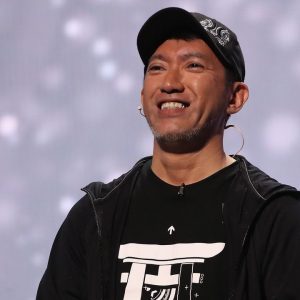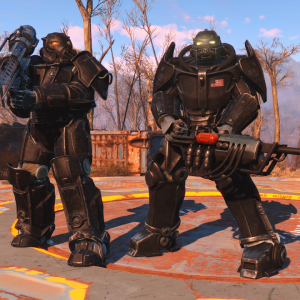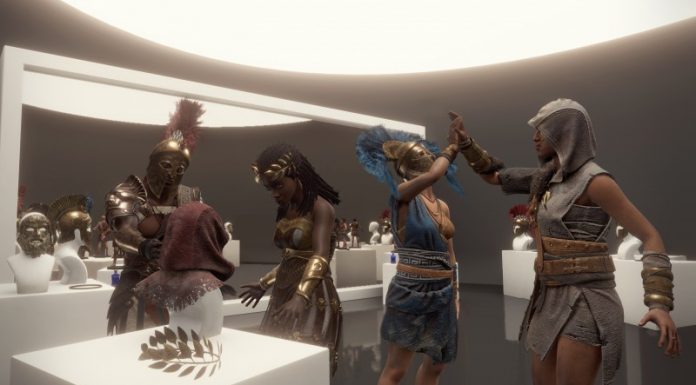A few months ago, the UK’s Competition and Markets Authority hinged its block of the Microsoft-Activision merger on cloud gaming, momentarily seeming to put to bed worries that Call of Duty exclusivity might kill the deal.
But as the FTC met Microsoft in a US court today over a potential pause on the impending acquisition, all the Call of Duty fears have been dredged right back up again. And it’s partially thanks to the no-longer-secret inner workings of a previous deal: Xbox’s 2021 acquisition of Zenimax.
Growing Up to Be Just Like Zenimax
The FTC had already dropped several hints that it was preparing to make an example of Zenimax, most notably in a recent filing calling the merger “powerful evidence” against the much larger absorption of Activision. But its precise arguments around this weren’t laid bare until today, when FTC counsel brought up Bethesda head of global publishing Pete Hines to answer questions about the earlier merger.
Hines was only on the witness stand for an hour, positioned between witness for the prosecution Xbox Game Studios head Matt Booty and defense witness Xbox corporate vice president Sarah Bond. The primary thrust of the FTC’s argument, consistent in both its filing and its examination of Hines, was that Zenimax released games across multiple platforms including PlayStation before it was acquired by Xbox. Now, under Xbox, it does not do so, and the same thing will inevitably happen if Xbox gets ahold of Activision.
Prior to Hines’ testimony, one element of setup from the FTC involved speaking to Xbox Game Studios head Matt Booty about, among other things, game exclusivity. After Xbox lawyers introduced a piece of evidence showing that games including Ghostwire: Tokyo, Outer Worlds, and Minecraft: Legends had come to non-Xbox platforms under its stewardship, the FTC countered that many games on the list had already been set to come to PlayStation prior to the merger. Only a few — most notably those related to Minecraft — were truly cross-platform at Xbox’s behest, and Zenimax’s catalog specifically had taken a sharp turn into exclusivity territory as soon as it cleared the last of its contractual obligations to Sony: specifically with Redfall, Starfield, and MachineGames’ upcoming Indiana Jones game.
With Hines on the witness stand, the FTC started on Starfield. The counsel referenced a clip of a 2021 GameSpot interview with Hines, where Hines noted that Starfield exclusivity wasn’t a consideration for Zenimax until it was bought up by Xbox. What’s more, Hines actively apologies to fans of Zenimax games who are disappointed in the news, saying, “There’s not a lot I can do about it.”
Next, the FTC brought up discussions of Zenimax studio MachineGames’ upcoming Indiana Jones game, putting forward evidence that it was originally licensed by Disney for a multiple console release on PS5 and Xbox. It was only after the acquisition that the contract was amended to stipulate an Xbox/PC exclusive and a day-one Game Pass release. And according to emails presented as evidence, the decision to do so wasn’t in Hines’ hands. Nor was he pleased when he found out other games, such as Call of Duty, might still have a PlayStation release as an option.
“I’m confused. Is the below not the opposite of what we were just asked (told) to do with our other titles?” Hines wrote in a 2022 email referring to an Xbox blog post on its plans for an “open app store.”
“Did anyone at Xbox think about giving us a heads-up on this? Todd [Howard’s] going to DICE in a couple weeks, you didn’t think a journo might find him and press him on why the below is ok for [Call of Duty] or any Activision Blizzard games, but not [The Elder Scrolls 6] or Starfield? Or at any/every future interview he does?”
Later in the examination, the FTC brought forward more of the same discussion, demonstrating that Hines was directed by Zenimax CEO James Leder to reach out to Xbox for clarification, again implying the decision was out of Zenimax hands entirely. So Hines went to Xbox head Phil Spencer, who took the conversation to a phone call, ending the email trail and, presumably, the discussion.
The Inevitable Call of Duty Conundrum
This is what the FTC seems to be claiming will happen with Call of Duty and other Activision games: Xbox can sign all the ten-year agreements it wants to keep Call of Duty available, but future games will inevitably go the way of Starfield and Indiana Jones, no matter how big a financial or reputational hit Xbox claims it would take from such a move.
And yes, Xbox has made substantial arguments in both its legal filings and elsewhere for why making Call of Duty exclusive would potentially cause harm to its own business — arguments that even the UK’s CMA seemed to accept. But in court today, its response to the Zenimax example specifically seemed to struggle.
Hines did point out during cross-examination that making Starfield exclusive had actually made development easier on the team. He referenced comments from Todd Howard calling Starfield an “irresponsibly large game,” saying that the fewer platforms you have to run QA tests on, the more testing you can do, and the better the game turns out.
“
“We would not be putting this game [Starfield] out in nine weeks if we were supporting an entire additional platform, in my opinion,” he said.
But the rest of his arguments didn’t come off as strong. When asked further what understanding on exclusivity he gleaned from his phone conversation with Spencer, he said, “That we were going to continue the approach that we already had, which is look at these on a title by title basis and decide what was best for those games, what was best for us.”
And when the judge questioned Hines on why it kept other agreements to bring games to PlayStation but amended Indiana Jones’, Hines’ answer didn’t seem to fully admit that his mind had been changed.
“There are a couple of different reasons, but the primary one in my view is what I said before about reducing risk and trying to get to a degree of certainty,” he said, reiterating his remarks about wanting to spend more time in QA with fewer platforms to deal with. “And truthfully, we also kind of liked the idea of embracing, bringing it to Game Pass and how many players we could get there.”
The judge pushed back, pointing out that all those factors existed when Zenimax first signed the contract to make the game.
“We were a small, independent publisher…we can’t afford to miss,” Hines responded, adding that the Xbox acquisition gave Zenimax the stability it needed to make that call, where as an independent studio, they needed to keep Disney happy by releasing to a broad audience.
Starfield v. Minecraft
This is where Hines’ testimony ended, leaving Xbox looking a bit unconvincing. But it’s worth pointing out that this is but day one of a multi-day trial, and both Booty and Hines were the FTC’s chosen witnesses. Bond, who was brought forward out of order, gave a far more convincing (for Microsoft) testimony about the struggles Xbox had bringing Activision content to its platform under the current market conditions, and sufficiently downplayed Xbox’s power in the cloud gaming space. And Xbox still has multiple other witnesses planned in the coming days.
What’s more, while the FTC thus far has spent significant energy trying to prove that Xbox will treat Activision like Zenimax, Microsoft has made clear that its own goal is to prove it will handle its potential new subsidiary more like Minecraft, a franchise that continues to enjoy global, cross-platform support with multiple multi-platform spin-offs. We have yet to see precisely how that argument will take shape, but Xbox has repeatedly sowed the seeds of Minecraft comparisons throughout both this trial and its bouts with the CMA, so it seems likely to appear in later examinations.
What may ultimately be Microsoft’s greatest struggle in this June trial is actually the FTC’s greatest benefit: the FTC doesn’t have to prove Xbox’s practices are anti-competitive. Not yet, anyway. As FTC counsel pointed out at the start of today’s trial, its purpose here is simply to gain more time to complete its investigation of the merger ahead of its originally planned hearings in August. We’re here now in June because the deal is set to complete next month, and the FTC is trying to slam a big red pause button so it doesn’t have to deal with the legal and regulatory headache of trying to undo a done deal post-merger, should it indeed find anti-competitive practices.
All that said, thus far, the FTC seems to be treating this like the big leagues. In his opening remarks, FTC counsel James Weingarten said that what it is presenting in this trial is “but a fraction” of the total evidence the FTC has accumulated thus far. Meaning that regardless of the outcome this week, in August, or in the coming months in the UK, we’re likely to continue hearing about these proceedings for a long time to come.
For a nice, tidy rundown of everything we learn, day by day, from this trial, check out our daily roundups right here on IGN.
Rebekah Valentine is a senior reporter for IGN. You can find her on Twitter @duckvalentine.





the1.21updateofficialnameis..._minecraftmonthly-youtube-googlechrome4_26_20242_39_36pm-300x300.png)


















